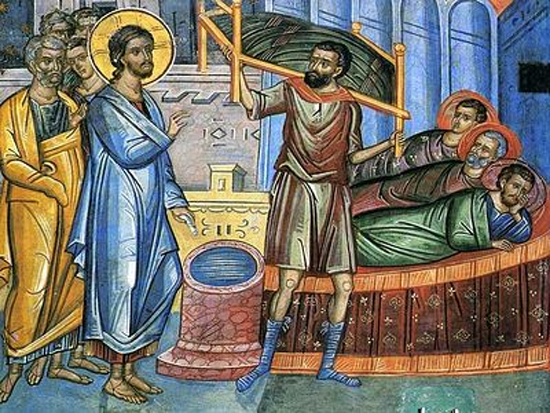Christian Art | Jesus Heals A Paralyzed Man
Matthew 9: 1-8 – Week 13 Ordinary Time, Thursday (King James Audio Bible KJV, Spoken Word)
1 AND he entered into a ship, and passed over, and came into his own city.
2 And, behold, they brought to him a man sick of the palsy, lying on a bed: and Jesus seeing their faith said unto the sick of the palsy; Son, be of good cheer; thy sins be forgiven thee.
3 And, behold, certain of the scribes said within themselves, This man blasphemeth.
4 And Jesus knowing their thoughts said, Wherefore think ye evil in your hearts?
5 For whether is easier, to say, Thy sins be forgiven thee; or to say, Arise, and walk?
6 But that ye may know that the Son of man hath power on earth to forgive sins, (then saith he to the sick of the palsy,) Arise, take up thy bed, and go unto thine house.
7 And he arose, and departed to his house.
8 But when the multitudes saw it, they marvelled, and glorified God, which had given such power unto men.
For the Jewish people, the sickness of the paralyzed man was a symptom of underlying sin. It was a punishment, a consequence of one’s own moral evil or of one’s parents. We can imagine the social consequences for the paralyzed man, in the light of the various exclusions which were applied to disabled people.
In Matthew’s Gospel, Jesus meets the paralyzed man, and those who carry him, on his way back from Decapolis to Capernaum, the city Jesus has made his home upon leaving Nazareth. In the equivalent passage in Mark’s Gospel, the situation is that there is a great crowd around Jesus, when Jesus is at home, and so the paralyzed man’s friends have the idea of climbing up to the roof to lower the paralyzed man down to Jesus, so that Jesus may heal him. This may illuminate the thought of Jesus ‘seeing their faith’ in today’s Gospel verses. In both Gospels, the journey toward Jesus is a journey of faith, marked by confidence in the truth of the healing miracles. We note that the paralyzed man cannot come to Jesus on his own; he needs his friends to bring him to Jesus. So the sinner may not be able to help himself, his sin being a kind of paralysis of heart. The sinner needs leading to Jesus by his friends.
Jesus tells the paralyzed man that his sins are forgiven. This might have seemed very strange to the man, who has come seeking a physical cure, but, of course, Jesus is looking to the heart of the man, and providing healing of that which is fundamental, of the man’s soul. The physical healing will also be provided, as a sign of the deeper cure.
For the Jewish scribes, this is a terrible thing for Jesus to say. It is blasphemy. Only God can forgive sins, and so Jesus appears to be arrogating to himself an exclusively divine authority, purporting to be as God. As they murmur against Jesus, because of the evil in their hearts, Jesus cuts through the scribes’ objections by asking them to think of the two types of healing, physical and spiritual. Which is easier – to say, to effect, to demonstrate? Anyone could have said, ‘Your sins are forgiven,’ but it was for Jesus to effect such healing, such that the words produced a new reality. It is the healing of the physical symptoms of sin that demonstrate Jesus’ power, and so also Jesus’ power over any underlying sin. This is to demonstrate divine power.
The Gospel verses tell us now that the people glorified God, who had given such authority to men to forgive sins. Through Jesus, the capacity for forgiveness becomes diffused to others as a human capacity. Matthew means us to know that we are able as people to forgive one another. There is no room in our healthy relationships with God and with one another to dwell on grievances. ‘Forgive us our trespasses, as we forgive others who trespass against us.’
Jesus passes on to his apostles the power to forgive sins: ‘[H]e breathed on them, and saith unto them, Receive ye the Holy Ghost: Whose soever sins ye remit, they are remitted unto them; and whose soever sins ye retain, they are retained.’ (John 20: 22-23) This delegated power comes down to us, as we confess our sins and as we ask forgiveness.
Miracle | Prayer | Healing | King James Audio Bible | KJV | King James Version
Concluding Prayer
BLESSED is he whose transgression is forgiven, whose sin is covered.
2 Blessed is the man unto whom the Lord imputeth not iniquity, and in whose spirit there is no guile.
3 When I kept silence, my bones waxed old through my roaring all the day long.
4 For day and night thy hand was heavy upon me: my moisture is turned into the drought of summer. Selah.
5 I acknowledged my sin unto thee, and mine iniquity have I not hid. I said, I will confess my transgressions unto the Lord; and thou forgavest the iniquity of my sin. Selah.
6 For this shall every one that is godly pray unto thee in a time when thou mayest be found: surely in the floods of great waters they shall not come nigh unto him.
7 Thou art my hiding place; thou shalt preserve me from trouble; thou shalt compass me about with songs of deliverance. Selah.
8 I will instruct thee and teach thee in the way which thou shalt go: I will guide thee with mine eye.
9 Be ye not as the horse, or as the mule, which have no understanding: whose mouth must be held in with bit and bridle, lest they come near unto thee.
10 Many sorrows shall be to the wicked: but he that trusteth in the Lord, mercy shall compass him about.
11 Be glad in the Lord, and rejoice, ye righteous: and shout for joy, all ye that are upright in heart. (Psalm 32/31)








